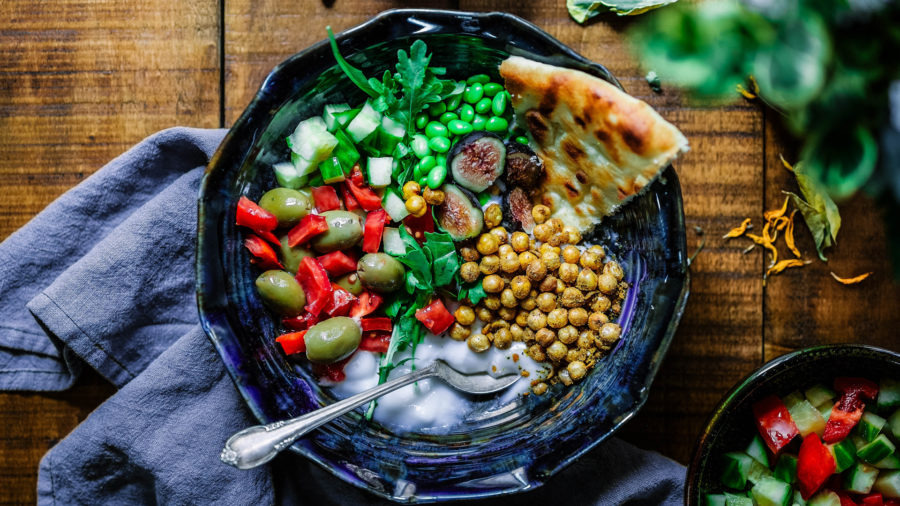
Startups make plant-based meals more convenient
Two trends are coming together to boost the fortunes of a new breed of food startups. Demand for delivery of meal kits and prepared meals and omnivorous consumers’ growing craving for plant-based foods are fueling growth for companies including Purple Carrot, Veestro and Hungryroot.
Revenue from meal kits is on track to hit $10 billion by 2020, according to Statista, and meal delivery sales are forecast to grow to $365 billion by 2030, according to UBS. Meanwhile, US retail sales of plant-based foods grew 8.1% to about $3.1 billion last year from 2017, according to Nielsen data commissioned by the Plant-Based Foods Association and the Good Food Institute.
Only a small percentage of consumers identify as vegan and vegetarian, but about 40% of people are increasingly eager to put more plants on their plates, and several 2019 forecasts identify plant-based meals as a hot trend.
Purple Carrot’s subscription model delivers three weekly plant-based meal kits, including recipes and pre-measured ingredients. About 82% of the company’s customers identify as omnivores, said Ashley Hocking, the company’s head of marketing.
“Purple Carrot appeals to people who may be ‘vegan curious’ or people who may just want to incorporate more fruits and vegetables into their diets,” she said.
The company, which launched in the fall of 2014, has delivered about 6 million meal kits since and it’s continuing to see demand grow, Hocking said. Purple Carrot’s research shows that 60% of consumers expressed interest in adding more plant-based ingredients to their meals, and the company recently added breakfast and lunch options.
Veestro’s model is also plant-based, but it delivers fresh-frozen prepared meals rather than meal kits. The company launched a year earlier than Purple Carrot and has seen similar trends when it comes to omnivores’ growing demand for plant-based meals. Only 58% of Veestro’s customers identify as vegetarian or vegan, down from about 90% the first year, according to co-founder Mark Fachler.
Hungryroot, which delivers ingredients and sauces that customers can use to create meals in about 10 minutes, isn’t completely plant-based, but it is plant-forward and focused on “clean” and “free from” ingredients. Only about 20% of the company’s customers are vegan.
“The Hungryroot customer is looking for an easy way to eat healthy and love incorporating plant-based and healthy animal proteins into their diet,” the company said in an email.
Both Purple Carrot and Veestro were created by entrepreneurs who started down a plant-based road because of their own health concerns. Purple Carrot founder Andy Levitt discovered the healing powers of plants after switching to a plant-based diet to treat his Crohn’s disease. Ultimately, he created the company to share that healing.
“So that millions of other people can discover how eating delicious plant-based meals, even if it’s just a couple times a week, can improve the overall quality of your life,” Hocking said.
Fachler’s health conditions weren’t as dire, but the Costa Rica native grew up on a produce-heavy diet before taking up the lifestyle and diet of a typical American college student in the 1990s. Quickserve meals and frozen pizzas took a toll in the years that followed, and Fachler turned to plants to help resolve his fatigue, weight gain and skin problems.
Health, the environment and animal welfare are the leading reasons more consumers are eager to eat more fruits and vegetables, and convenience is a key selling point for meal kits.
But for vegans, vegetarians and omnivores alike, the food must first and foremost be tasty. Further, for those just getting into plant-based eating, it helps to have plenty of choices that are familiar.
At Purple Carrot, customers clamor for plant-based versions of popular comfort foods including tacos and vegan Philly cheesesteaks, and Asian dishes including dumplings, Hocking said. Hungryroot’s top sellers include Black Bean Brownie Batter and Baked Peanut General Tso’s Tofu, the company said.
Veestro’s lineup includes vegan versions of familiar dishes like country fried chick’n and shepherdless pie, as well as more obviously plant-based dishes including kale and quinoa salad and eggplant casserole.
Variety is key, but so is helping customers discover their favorite dishes, and popular items stay on Veestro’s menu throughout the seasons to feed demand, Fackler said.
“We believe in our mission and [eating plants] makes sense for everybody. So, we want everybody to try it, we want everybody to eat more plants.”

